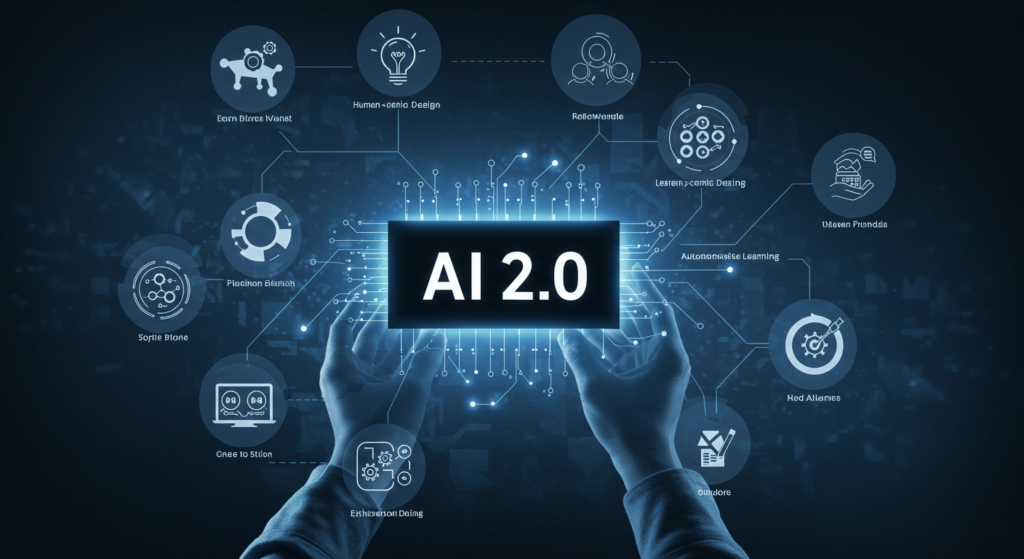
AI 2.0: The Next Generation of Artificial Intelligence
Artificial Intelligence (AI) has come a long way since its inception, and we are now entering a new era often referred to as AI 2.0. But what exactly does AI 2.0 mean, and how does it differ from the earlier stages of AI? In this article, we will explore the concept of AI 2.0, its defining features, and its potential impact on various industries.
What is AI 2.0?
AI 2.0 is the term used to describe the next generation of artificial intelligence technologies and applications. Unlike earlier versions of AI, which primarily focused on narrow, task-specific applications, AI 2.0 is about creating systems that are smarter, more adaptable, and more aligned with human needs and ethics. It represents a shift toward more advanced, efficient, and human-like AI solutions.
Key Characteristics of AI 2.0
AI 2.0 stands out from earlier AI developments in several significant ways. Here are some of its key features:
1. Human-Centric Design
AI 2.0 systems are designed to interact seamlessly with humans. These systems can understand natural language better, respond more intelligently, and even recognize human emotions to create personalized and engaging experiences.
2. Explainable AI (XAI)
One of the criticisms of earlier AI models was their “black-box” nature, where users could not understand how decisions were made. AI 2.0 focuses on explainability, ensuring that the decision-making processes of AI systems are transparent and easy to understand. This builds trust and ensures accountability.
3. Autonomous Learning
Traditional AI systems often relied on large amounts of labeled data and human guidance. In contrast, AI 2.0 incorporates advanced learning techniques like reinforcement learning and unsupervised learning, enabling machines to learn and adapt autonomously from their environments.
4. Moving Toward General Intelligence
AI 2.0 represents progress toward Artificial General Intelligence (AGI), where machines are capable of performing a wide range of tasks with the same adaptability and reasoning as humans. While true AGI remains a future goal, AI 2.0 is a significant step in that direction.
5. Efficiency and Scalability
With advancements in hardware and algorithms, AI 2.0 systems are faster, more efficient, and more scalable. Technologies like quantum computing and neuromorphic chips are driving this evolution, enabling AI systems to process massive amounts of data with reduced energy consumption.
6. Real-World Applications
AI 2.0 is not just theoretical—it is already transforming industries. From autonomous vehicles and advanced robotics to real-time medical diagnostics and intelligent business processes, AI 2.0 is making a tangible impact on the world.
7. Ethical and Responsible AI
AI 2.0 places a strong emphasis on ethics and responsibility. This includes addressing issues like algorithmic bias, ensuring data privacy, and aligning AI systems with societal values. These measures are critical for fostering trust and ensuring AI benefits everyone.
Why Does AI 2.0 Matter?
The transition to AI 2.0 has profound implications for businesses, individuals, and society as a whole. By making AI systems smarter, more efficient, and more aligned with human values, AI 2.0 opens up new possibilities for innovation while addressing many of the concerns associated with earlier AI models.
For businesses, AI 2.0 can revolutionize operations, improve customer experiences, and drive innovation across industries. For individuals, it means interacting with AI systems that are more intuitive, personalized, and helpful. On a societal level, AI 2.0 offers the potential for solving complex global challenges, from healthcare to climate change.
Conclusion
AI 2.0 marks an exciting new chapter in the evolution of artificial intelligence. With its focus on human-centric design, explainability, efficiency, and ethics, AI 2.0 is set to transform the way we interact with technology and unlock new opportunities for growth and innovation. As we embrace this next generation of AI, it is essential to ensure that these systems are developed responsibly to benefit all of humanity.
